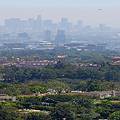 新研究發現,柴油廢氣污染和高膽固醇兩種因素的結合,造成心臟病與中風的風險,高於只有其中一種因素存在。該研究指出,控制空氣污染可能是預防心血管疾病的重要工具。
新研究發現,柴油廢氣污染和高膽固醇兩種因素的結合,造成心臟病與中風的風險,高於只有其中一種因素存在。該研究指出,控制空氣污染可能是預防心血管疾病的重要工具。
26日公佈於電子期刊「生物基因體學」(Genome Biology)的研究,首次闡釋空氣污染中的微細粒子如何與堵塞血管的脂肪共同啟動造成血管發炎的基因,而導致動脈硬化和心血管疾病的發生。
該計畫首席研究者為加州大學洛杉磯分校大衛葛芬醫學院的奈米醫學主任,同時是該校加州奈米系統中心的研究員內爾(André Nel)博士表示:「我們尚未明瞭這些空氣污染成份造成心血管損傷的確切機制,但是我們知道包覆在這些粒子外圍的化學物質能夠傷害人體組織,並且造成鼻腔與肺部發炎。血管發炎進而形成膽固醇沈澱和動脈阻塞,如此產生的血凝塊便會引起心臟病與中風。」
研究人員將嘗試創造一種生物標誌(biomarker)以便醫生很容易地評估空氣污染對於新血管疾病的效應。
Exposure to a combination of diesel exhaust and high blood cholesterol increases the risk for heart attack and stroke far more than exposure to either factor alone, new research reveals. The results indicate that controlling air pollution may prove to be a powerful tool for preventing cardiovascular disease.
Published in today's edition of the online journal "Genome Biology," the study is the first to explain how fine particles in air pollution work with artery-clogging fats to switch on the genes that cause blood vessel inflammation and lead to hardening of the arteries and cardiovascular disease.
"Exactly how air pollutants cause cardiovascular injury is poorly understood," Nel (principal investigator Dr. André Nel, chief of nanomedicine at the David Geffen School of Medicine at UCLA and a researcher at UCLA's California NanoSystems Institute) said. "But we do know that these particles are coated with chemicals that damage tissue and cause inflammation of the nose and lungs. Vascular inflammation in turn leads to cholesterol deposits and clogged arteries, which can give rise to blood clots that trigger heart attack or stroke."
The researchers will now attempt to create a biomarker that will enable doctors to easily evaluate air pollution's effect on cardiovascular disease.
全文及圖片詳見ENS



